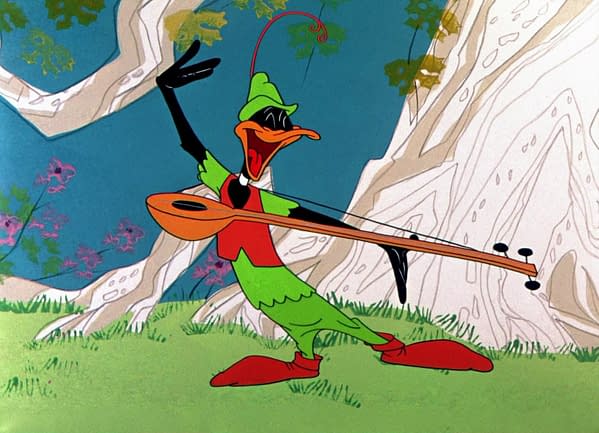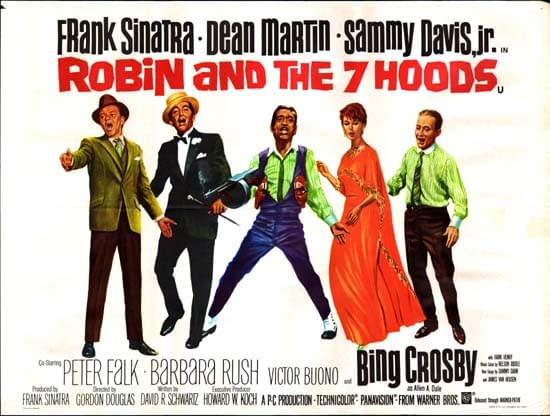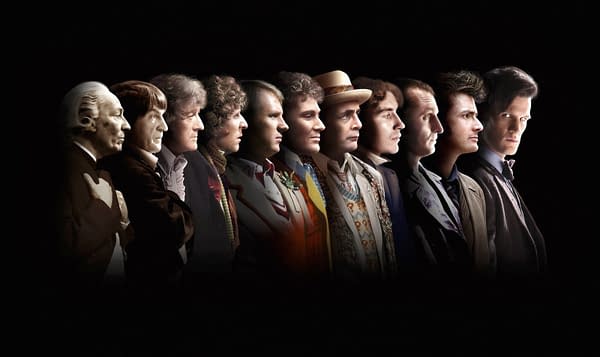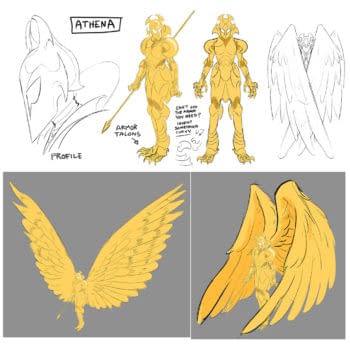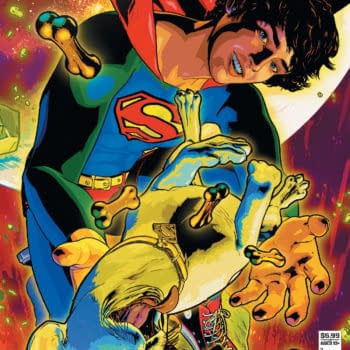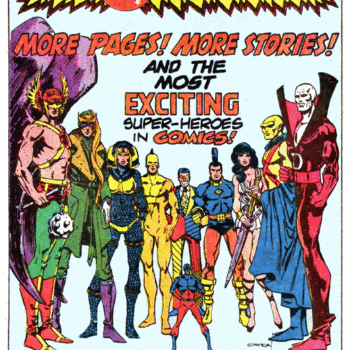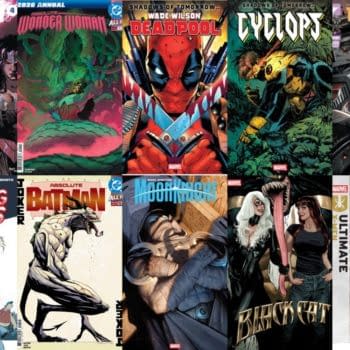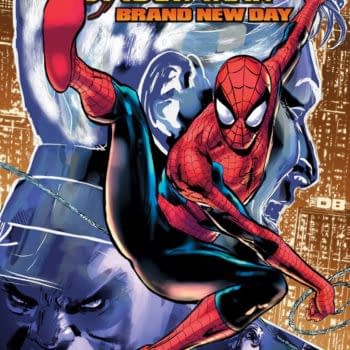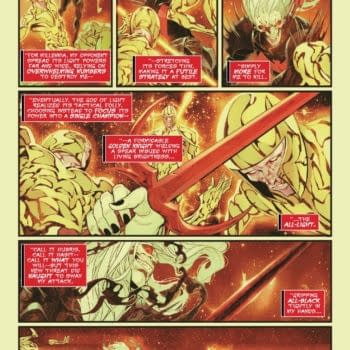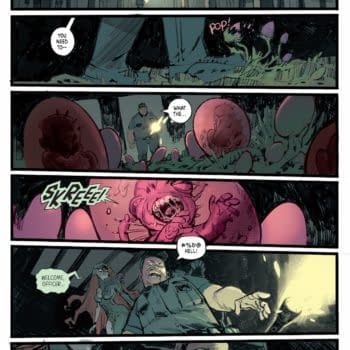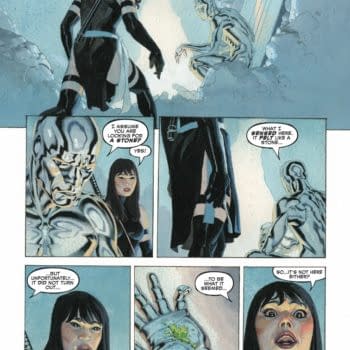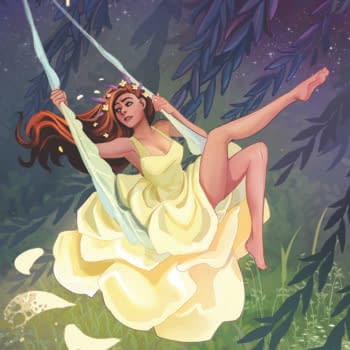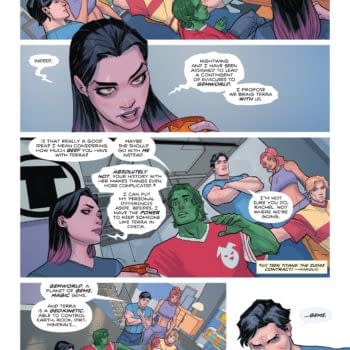Posted in: Comics | Tagged: athiny jones, hood, kickstarter
Just Like Dr Who. With More Guns. Less Time Travel.
Anthony Jones writes;
Authors note. I'll use the phrase "reboot" and "remake" interchangeably throughout this piece in full knowledge that technically they're different things. Regardless I'll swap words at whim both because I can and because saying reboot/remake every paragraph will get dull really quickly.
The "Re" Word
A couple of months ago I was very kindly given the space to chat about my comic project Hood – a modern action-noir take on the Robin Hood tale. Since then I've had some positive and (thankfully not too much) negative feedback which has been awesomely useful in shaping my vision and subsequent Kickstarter campaign (which is in it's last 10 days).
Along the way though,I've discovered a little something about myself which has proven a bit awkward – I'm an incredible snob when it comes to re-makes or re-boots. As soon as the 're' word tiptoes into my aural vicinity my spine attempts to forcibly eject itself and I start trying to reflexively swallow my own tongue.
And I don't think I'm alone in that.
The reflexive argument against remakes or reboots is usually either decrying a lack of imagination on the part of the creative team or more often they're seen as a way for companies to milk the living hell out of their Intellectual Properties. That perceived laziness rubs our rhubarb the wrong way and we quite rightly assume it's going to be substandard (and it's not often we're proven wrong). In our heads we want our creative teams to sweat and toil at the forge of imagination – not dust down an old story, change the names, add some CGI and then charge us money for it.
Lets face it, there's enough evidence of remakes both in comics and films that have been terrible because they quite transparently are just that – a lazy attempt to get at our wallets. Often, when shambling out of a cinema i'll drop to my knees in the rain and utter a shatner-like scream "never again!" before being quietly ushered along by the security guards. That, over time, has built up to the gut clenching dislike of remakes I have today.
The thing is, I'm not sure that's the whole picture.
See the other angle attack against reboots is one of possessiveness. There's also those of us who were there 'the first time around' who instantly get defensive when someone messes with 'our' story. We feel we have a sense of ownership over a property and by gods will we get on the message boards if someone messes with it – that's you I'm talking to Mr Affleck.
Publishers and production companies can be dismissive of that possessiveness but as both a writer and audience member I don't think we're wrong in that sense of ownership. I believe that any good story revolves around the emotional transaction between creator and audience. If I want you to invest in a character or a plot, I expect you to put your own emotional currency into the pot.
At that point its as much your story as it is mine – you can tell the stories that encourage that kind of investment in the nature of the fans it breeds. Hell, I want a creative team to invite me to fall a little in love with their characters and plot (hello Saga), I want a film where I can transpose a little bit of myself into the big frame. Therapists might call it emotional transference – I think most of us would call it 'losing ourselves' in a good book, comic or film.
See a good story is like a promise, "I promise to take you away from all this", "even take you away from yourself for a little while" – you spend your time (and money) and allow it to take root in your imagination. I've fallen in love, saved the world and had my heart broken a thousand times over in film, comic and book.
With that kind of transaction in mind, of course you have a right to get pissy if some executive decides that it's time for it to be spruced up with the latest underwear model in a lead role or a polyamourous version of your favourite superhero. Of course you should be angry – they're taking something that has real emotional relevance and trying to swap it with a plastic facsimile designed to sell more T-Shirts.
Executives don't get it, they rarely have the same emotional connection to a project that you, the audience, had and even if they do the joys and curse of a good story is that their perception can often be wildly different. In the end the cinema of the mind only seats one person and everyone sees something different.
The frustrating thing is that a good remake isn't _that_ difficult to make – if you can tear the plaster of that emotional connection just enough there's a lot of scope for enjoyment. Marvel have proved over the last few years it can be done in both comics and film, DC has struggled somewhat recently but seems to be finding its feet with Superman and Batman etc.
Admittedly I did think Man of Steel or 'Super Murder-Fun-Spandex Man' was a bag of rubbish but at the same time it brought in the box office dollars and appears to be enough of a justification for future movies so what do I know?
There lies part of my frustration. When I started this article I wanted to explore some of the aspects that make a 'good' remake and what makes a 'bad' one. Unfortunately for me it appears the rest of the fiscally armed general public would disagree with me on that score – hell even Spider-Man 3 pulled in something like $890 million and I'll go to my deathbed decrying that one!
I know there must be some universally defining aspects of a good remake. An element of homage while introducing something new to surprise and entertain. A translation of the core messages and themes into a new package perhaps. But ultimately we link back to the idea of personal investment and our own private theatre and I realise that my perfect remake may well focus on story elements (because that's what floats my boat) but yours might consist entirely of slow motion explosions and male models.
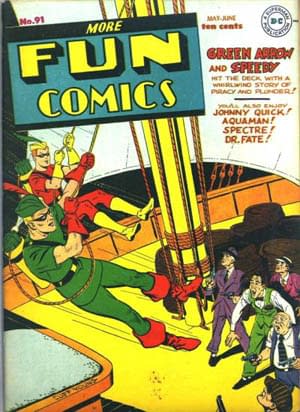
"How much of a story do you change before it's basically just a new story dressed up in old clothes?"
and
"How much audience/money/emotional investment will that lose me?"
I think it's fair to say, the less you change of the original, the poorer the exercise of remaking it will be perceived to be. On the flip side, the more you change, the more you lose not just in terms of loyalty of existing fans (which i don't think are a big concern to the guys who are trying to break into new market segments and sell lunch boxes) but also in terms of emotional resonance.
And emotional resonance is a key element of what we in marketing call our brand and taps directly into that whole audience investment thing I chatted about earlier. It's how an icon, a story or a character makes us immediately feel before we even get involved in the plot. It's why I didn't like Man of Steel but I _did_ like Batman – because the second was a Batman story and the first was about a sociopath with superpowers. Of course that branding and emotional resonance is why the majority of the comics industry (and film industry) is still obsessed with properties it developed decades ago – because like it or not, familiar makes a lot more money than unfamiliar.
In the end that's what it comes down to, money. It's easier (for us poor indie schmucks in the trenches) to engage an audience, publisher or producer off the back of something else that was already familiar. I've had the same problems with my own Hood comic for the same reason. "It's Robin Hood with gangsters" is what I sell it as because it's easy for someone to emotionally connect with (and hopefully spend their money on). If I tried to sell it as something far more multilayered and a little bit unique (as much as any story is unique) then I'd have a much harder slog trying to explain all the aspects of it.
In the end editors aren't the only ones who want it simple. Consumers like you and I want to know what we're getting before we invest in it. When it comes to that things end, no matter how old we get we we don't want to let go, why should we? That safe and emotional feeling of escapism we got from that comic, that show, that movie – we don't want that to ever end so it's much better for us to invest in the reboot, remake, regeneration of our characters than explore something different.
Can you imagine if the BBC tried to do another space and time travel show about a group of guys who had adventures on wacky planets? No. Neither can I. They learned the value and set the expectations of reboots long ago – now it's just part of the schema in the same way no one ever dies in comics.
So as I conclude this thought process do I feel any better or worse about reboots?
Well. No. Not really.
My first reaction to the 47 Ronin movie for example, was to scream at the heavens and forbid any of my friends to see it. I'm still a writing snob after all and the actual historical legend is significantly better than any dragon and witch orientated movie.
But at least I understand that's it's not necessarily some Cthulhuoid studio exec or editor pulling the strings and breaking my dreams. My emotional ownership of the original won't ever change but in the same way that a writer or artist has to let their story go into the audiences' hands – I have to do the same and let new audiences invest _their_ currency into the new generation of stories.
And maybe I'll catch them later on Netflix and find out the remake's not so bad after all.
Ant Jones is a British writer and marketing consultant. One job pays the bills, the other lets him get very angry about the repurposing of Japanese myth. His latest action-noir comic project, Hood, is in the last 10 days of its Kickstarter. He describes it as "inspired by Robin Hood in the same way Sons of Anarchy is inspired by Hamlet, which is to say it is, but there's much more to it than that".



